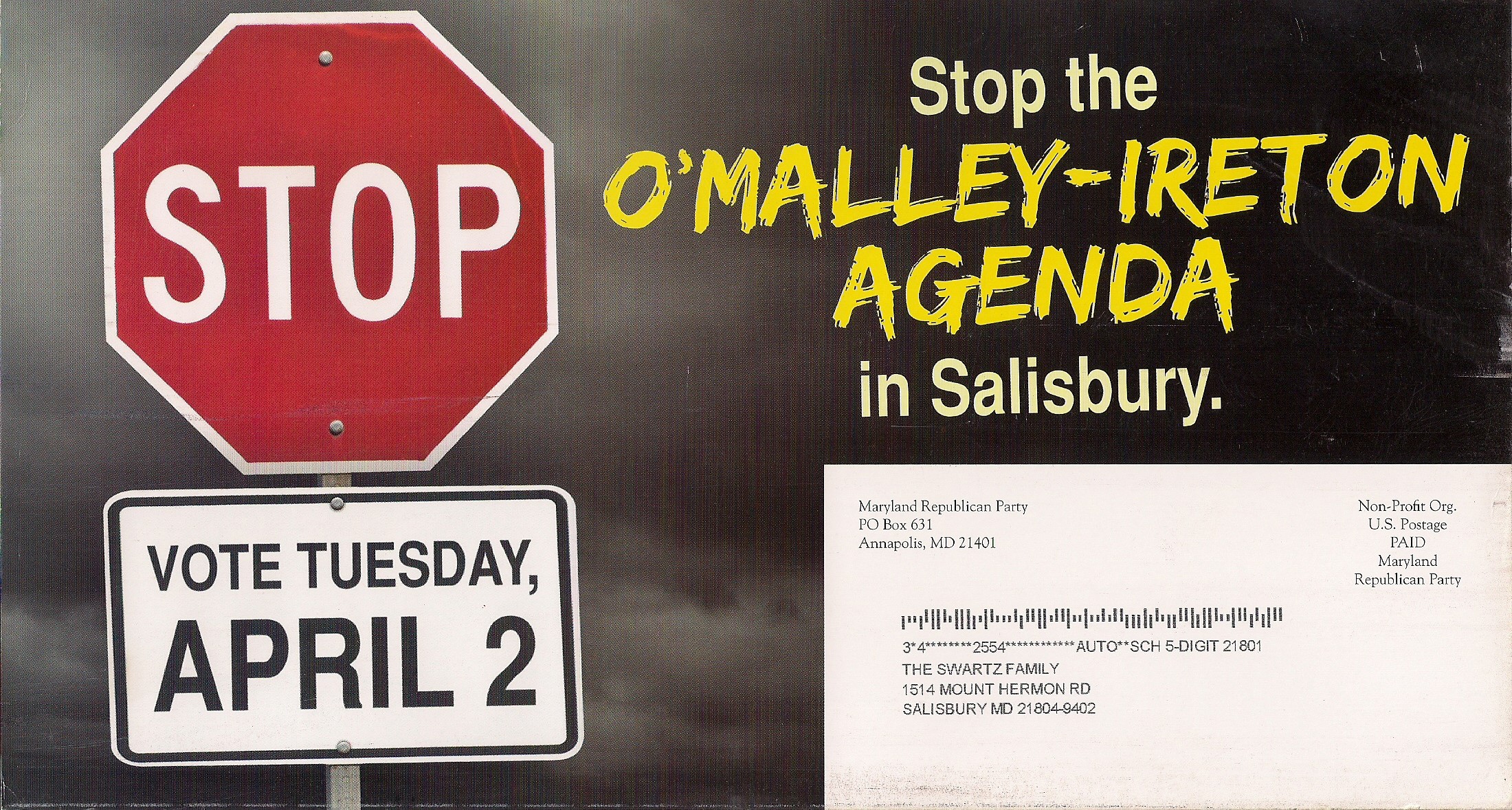Since it’s Super Bowl Sunday and the better part of my audience is going to be tuned into the game because the hometown Ravens are playing, I thought it a good time to clean out my e-mail box and join the celebration. (As a Lions and Browns fan, I’m watching for the commercials. Maybe someday I can have a rooting interest.)
Last week those of us in Maryland were subjected to the State of the State address by Governor O’Malley. In the footnoted version, it’s 14 pages of bilge and big government. The “official” Republican response by Delegate Andrew Serafini (the last 15 minutes here) seemed awfully tepid, so you knew others might have both barrels blazing.
Enter Change Maryland head Larry Hogan, who skewered O’Malley’s speech with a rhetorical spit:
Governor O’Malley’s slogan used to be ‘believe’ but that speech was pure make believe. The Governor continues to misuse facts to portray a false narrative of his administration’s legacy. Only Martin O’Malley could actually call a 30 percent increase in spending and a budget he has increased by $9 billion as making government smaller…The governor said he cut $8.3 billion but that’s just not true. He has increased spending every single year since he has been governor, a total of more than $9 billion. So his math is off by more than $17 billion.
He talked of making tough choices, but after 24 consecutive tax and fee hikes, the only tough choice he has to make is what can we possibly tax next?
Governor O’Malley said we have the worst traffic congestion in the nation. On this we agree. But he failed to tell you that he is the reason we are in this predicament because he diverted funds from the transportation trust fund to pay for other things, and then of what was left in the transportation budget, he only allocated a tiny amount to roads.
He talked about what he inherited. I was a cabinet secretary in the previous administration, and I can tell you that when we turned the keys over to the O’Malley administration, we had a billion dollar cash surplus in the bank, and the state was in the best fiscal shape it had been in decades.
Just six years later and by any objective measure, by any objective group, the state is in far worse shape than ever before. Businesses, jobs and taxpayers are fleeing our state in record numbers. We have fallen behind all the states in our region and most states across the country in nearly every economic indicator.
But Larry saved the best for last:
Unfortunately he checked out of this job some time ago, and is focused on his next one. His entire focus is about his national political aspirations and not about the needs of average hard-working Marylanders who continue to struggle.
I guess he means O’Malley’s future job as a consultant? Sure, he may run for the 2016 Presidential nomination and maybe try again four years later. But Maryland’s getting tired of his one-trick act.
While Hogan may or may not be running for governor, we know David Craig is. His reaction, in part:
Today Governor O’Malley offered a narrative about better choices in his State of the State Address. I share the Governor’s passion for better choices and a better Maryland. The Governor’s choices; however, have resulted in a higher tax burden for Maryland families and businesses, increased regulation, and a myriad of unfunded mandates passed on to local governments.
I would like to offer an alternative vision. We need to strive for the “Best Maryland”. The Best Maryland begins by government allowing individuals and business to lead in partnership with the State. We need to continue to improve our state, but not at the expense of the taxpayer.
We need to make pragmatic choices that balance our priorities and encourage private-sector growth and investment. The “Best Maryland” begins with an approach where our state is not dominated by one set of ideas and one set of leaders.
Is there really anything to that statement? Honestly, who wrote that?
At least with Delegates Susan Aumann and Kathy Szeliga, you have the scripted banter of a rebuttal. It’s worth pointing out that the wind turbines would be in the Atlantic Ocean, not Chesapeake Bay.
But the reaction to one portion of the State of the State address will be seen this coming Wednesday as Second Amendment supporters gather in Annapolis to protest the gun grabbing bill sponsored by Martin O’Malley. Those coming from the lower Eastern Shore to protest have an additional travel option. From the Wicomico Society of Patriots:
Things are heating up in Annapolis with two important hearings occurring on February 6th. The gun hearing will be held before the Senate Judicial Proceedings Committee at 1:00 p.m. and Mike McDermott’s repeal (HB106) of the 2012 septic bill hearing will be held before the Environmental Matters Committee (House of Delegates) at 1:00 p.m.
If you would like to attend to testify on either of these issues or to protest, then you can drive up yourself or you can sign up to ride on a bus with other patriots.
Bus Option #1: Worcester Tea Party and Stop Agenda 21 are sponsoring a bus to go to Annapolis on Feb. 6th. The bus will leave WOC Park & Ride at 7:30am and Boscov’s in Salisbury at 8:15 am. Call 410 251 3585 or 410 430 7282 to reserve your seat. Also, you can email: www.worcestercountyteaparty.com or stopagenda21maryland.org for more information. Cost is $10.
Bus Option #2: Jamie Wink at Wink’s Gun Shop in Princess Anne is also sponsoring a bus to go to Annapolis. Please call Jamie at 443 783 3993 for more information about this bus trip. Cost is $20.
I think Jamie Wink would be a great monoblogue advertiser, how about you?
One important note about the proceedings:
If you are testifying: Please arrive as early as possible to sign in, the committee will take sign ins until about noon. You will be given 3 minutes to speak.
If you are submitting written testimony you must bring a copy for each of the Senators who sit on the committee (11 copies) and submit them to Committee staff before noon so they can make sure all of the Senators have the materials on their desks.
There are various parking garages in Annapolis, or you can park at the Naval Academy Stadium and ride the Annapolis Shuttle/Trolley to Lawyers Mall – The Senate Building is right across the Street.
Be prepared to spend the whole day here, whether you testify or not, what is important is that we are there in numbers to stand in opposition. We need thousands of gun owners.
They have all night. However, a little organization may be in order as those who rode the bus (and may have to return by a set time) should speak first. Also be aware that the committee chairs (Senator Brian Frosh and Delegate Maggie McIntosh) are probably going to be more of a stickler for rules and time limits from the pro-liberty side than from those wanting gun restrictions and more oppressive government.
More on SB281 from the National Association for Gun Rights:
Senate Bill 281 drastically broadens the definition of an assault weapon and constitutes one of the most outrageous assault weapon bans proposed in the country.
This bill classifies 15 different types of semi-automatic pistols as “assault weapons” as well as certain types of shotguns and rifles.
This means that if Senate Bill 281 passes these guns will be illegal to purchase or bring into the State of Maryland.
This 38-page bill also bans high-capacity magazines limiting ammunition magazines to 10 rounds.
If this bill becomes law, it criminalizes all citizens owning newly banned weapons unless they immediately register their guns with the State of Maryland.
Gun owners who don’t register their “banned” weapons would face up to 3 years in jail or a $5,000 dollar fine under O’Malley’s Gun Grab Bill.
Current law governing carry permits in Maryland makes it almost impossible to carry, yet this bill will make it even harder by requiring a new 16-hour handgun training course.
To purchase or rent a handgun, citizens will now have to pay roughly $400 dollars in fees, background checks, training courses, and finger-printing.
How many criminals will this make out of otherwise law-abiding citizens? Registration can be the first step toward confiscation.
I can almost guarantee you that a vote on SB281 (whether a floor vote or committee vote) will be part of the 2013 monoblogue Accountability Project.
But let’s not forget the federal level. I received this note from Heritage Action for America, which alerted me that they are “…looking to build a movement of conservative activists in these areas to hold Congress accountable.” I think I have enough readers all across the Shore who can fit the bill.
These readers (and many others) owe it to themselves to consider a piece by Bradlee Dean at The Brenner Brief. You probably remember Bradlee from his visit last October to the Wicomico Society of Patriots meeting, but in this case he’s speaking more about the idea of obedience to the state rather than to God, and how to reconcile the two.
Finally, the question on everyone’s mind: who will win the big game, the Ravens or 49ers? For the Move America Forward group and their troop care package competition, it’s a razor-thin margin after the 49ers jumped out to an early lead. We’ll see if the real Super Bowl follows the same pattern.
My prediction: Ravens, 30-28. Not that I much like it, but Baltimore’s shown a history of winning games they had no business winning – just ask Cleveland, Kansas City, San Diego, Denver, and New England (arguably Dallas, too.) A little karma the other way and they may have been 8-8.
But at the end I’m going to say what I have said for many years, beginning with ex-wife #1:
Me: Well, the Super Bowl is over, so you know what that means…
Spousal unit: What?
Me: (in a rising voice): Only seven days until PITCHERS AND CATCHERS REPORT!! (Nine for Orioles fans.)
Bring on the baseball season, baby. My Tigers have some unfinished business to take care of. (Sorry, Orioles. Your time will come.)




